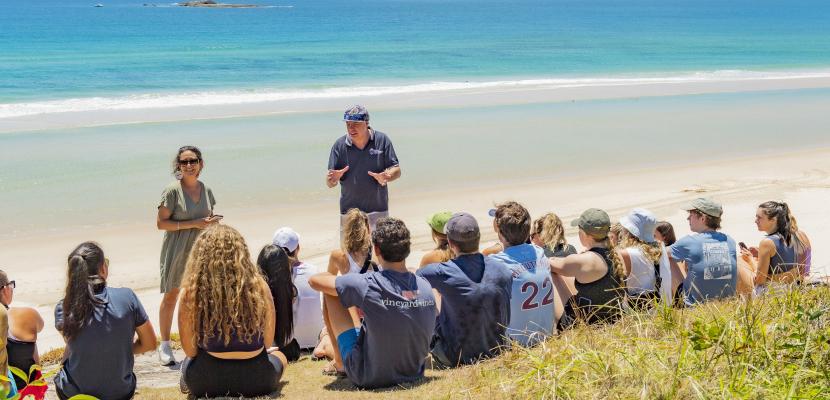American student Ben Yuter reeled in some extra credit during his Study Abroad Program field trip to North Stradbroke Island.
With the guidance of Bond University's Associate Professor Daryl McPhee, Mr Yuter hooked an 84cm mulloway at Amity Point.
Oops, something went wrong.
"It wasn't until halfway through reeling it in that it started to put up a fight," Mr Yuter said. "It was easily the biggest and rarest fish I have ever caught, and my family was so surprised that I caught a fish while I was away on a class trip."
The finance and computer science student from Bentley University near Boston was on Straddie to take part in Island Class, a series of four-day field trips hosted by Dr McPhee, an environmental scientist and keen angler.

"Mulloway are a prized fish for any angler in Moreton Bay,” Dr McPhee said. “Many a serious angler has not landed a mulloway the size of Ben's."
During their trip to the world’s second largest sand island, Island Class students map seagrass, assess the impact of four-wheel-drive traffic on ghost crabs and study marine debris, among other projects.

They also learn about the Quandamooka people’s more than 20,000-year history on the island they call Minjerribah, taking part in a Welcome to Country and smoking ceremony.
Students witness ceremonial dances about animals central to the lives of the local Aboriginal people, such as sea eagles and dolphins, and munch on native foods like wild warrigal greens at Point Lookout.
At a recent Island Class, students posed for selfies with wildlife including goannas and kangaroos.

“It's a beautiful island, untouched in terms of its environment and the views are spectacular,” Mr Yuter said.
“I mean, I was just walking five minutes ago and saw a kangaroo and her joey.”
Dr McPhee has been running Island Class since 2012.
“I've been coming to Stradbroke since I was a little tacker,” he said.

“There are very few places in southeast Queensland where you can see magnificent surf beaches, koalas, kangaroos and amazing cultural heritage that's still significantly intact.”
Dr McPhee, who rose from homelessness to become an international expert on shark behaviour, provides three $2000 bursaries so international students at Bond University can attend Island Class and share his passion.
“I've done that to give back to our emerging leaders and I hope that they develop a deep understanding of the Australian environment and its culture, both European but in particular, First Nations culture,” he said.
“I hope that they feel a sense of belonging and support during their academic journey.”

One of the bursary students, Teresa Vielma, said she was blown away by the natural beauty of the island.
“It was a really amazing experience to come to this island and learn about the Aboriginal culture,” she said.
“We just did a hike along beautiful beaches and I saw sea turtles and manta rays -- just incredible views.

“(Getting the bursary) has made my experience so much better. It's given me greater financial security to be able to travel here.”
Almost 100 students take part in Island Class across three field trips during February and March.
They also participate in a beach clean-up using hops bags donated by Straddie Brewing Co at Dunwich.